Trump and Africa: How Ethiopia was 'betrayed' over Nile dam
- Published
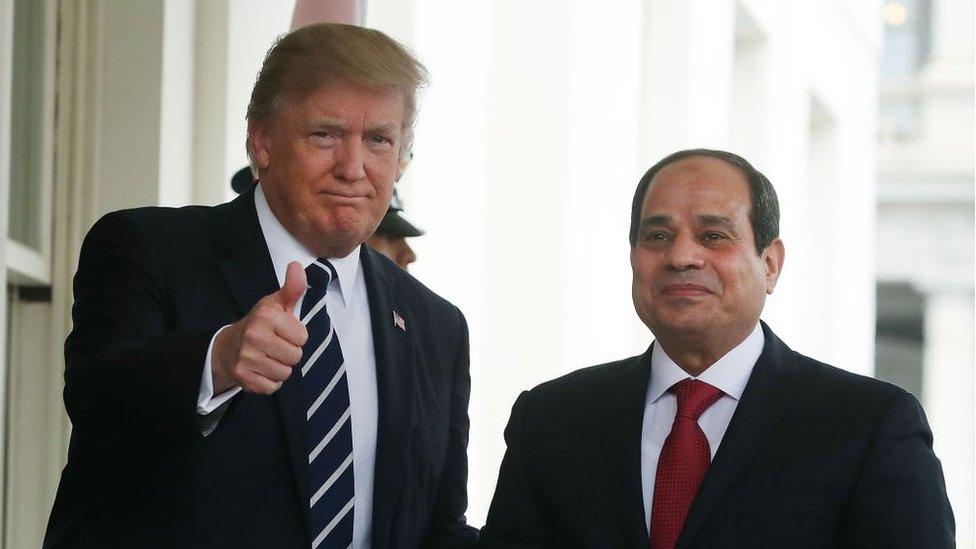
Donald Trump has backed Egypt's President Sisi over the River Nile dam
For critics of US President Donald Trump, escalating tensions between two long-standing American allies, Egypt and Ethiopia, over a mega dam on a tributary of the River Nile marks the biggest diplomatic failure of his administration in Africa.
Mr Trump said last week that Egypt might "blow up" the Ethiopian-built dam, despite boasting in January that he deserved a Nobel Peace Prize because he had "made a deal".
"I saved a big war. I've saved a couple of them," he said, shortly after Ethiopia's Prime Minister Abi Ahmed was awarded the prize.
Mr Trump's comments were vague, but seemed to be a reference to his intervention - at the request of Egypt's President Abdel Fattah al-Sisi, whom he once reportedly called his "favourite dictator", external - to resolve the dispute over the Grand Ethiopian Renaissance Dam (Gerd).
Egypt sees the dam as an "existential threat" to its survival, a concern shared, albeit to a lesser extent, by Sudan. Ethiopia, on the other hand, regards the dam as vital for its energy needs.
Trump a 'hate figure for Ethiopians'
Kenya-based Horn of Africa security analyst Rashid Abdi said US mediation over the dam had worsened tensions between Egypt and Ethiopia.
"Ethiopia is stepping up security around the dam," Mr Abdi said.
"Its defensive measures include declaring the Benishangul-Gumuz region, where the dam is located, a restricted airspace, and there are also reports that Ethiopia is putting up anti-aircraft batteries around the dam. It probably fears reconnaissance flights by Egypt."
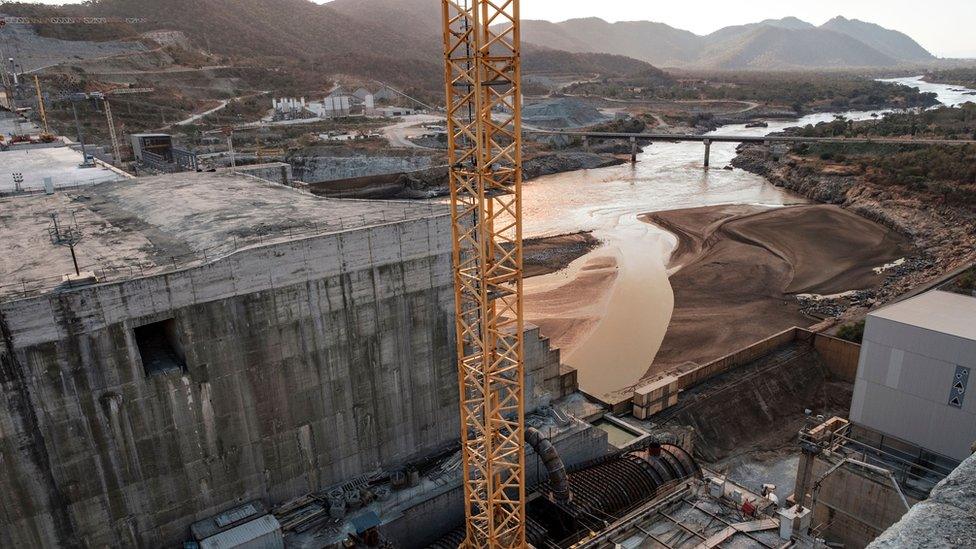
Once complete, the $4bn (£3bn), structure on the Blue Nile in Ethiopia will be Africa's largest hydro-electric project
He said this showed Mr Trump's failure to understand how global diplomacy worked.
"He has this misconceived notion that you can cut a deal like in business. So he left the US Treasury to play the lead role in negotiations, when foreign policy is supposed to be conducted by the State Department. The consequences have been to aggravate an already bad situation," Mr Abdi added.
Accusing Ethiopia of negotiating in bad faith following its decision to press ahead with filling the dam before addressing Egypt's and Sudan's concerns about the flow of water to their countries, the US has decided to cut a reported $100m ($$77m) in aid to Ethiopia - Africa's second most-populous state, and a key US ally in the fight against militant Islamists in the volatile Horn of Africa.
"Ethiopia feels betrayed by America, and Trump is now a hate-figure for many Ethiopians," Mr Abdi said, adding that they would be hoping for a Joe Biden victory in the 3 November presidential election.

Explore the Nile with 360 video
Alastair Leithead and his team travelled in 2018 from the Blue Nile's source to the sea - through Ethiopia and Sudan into Egypt.

W Gyude Moore, a senior policy fellow at the US-based Center for Global Development, said the Trump's administration decision to side with Egypt was not surprising as its most prized international goal was rapprochement between Israel and Arab League nations.
Trump's diplomatic coup
As Egypt had long-standing diplomatic relations with Israel, the Trump administration was not going to antagonise it at a time when it needed Mr Sisi's help to lobby other Arab states to recognise Israel, Mr Moore said.
"So, the administration became a party in the dispute over the dam, on the side of Egypt," he added.
Its focus on achieving Arab-Israeli rapprochement also shaped its policy towards Sudan, which gave Mr Trump a major diplomatic coup by agreeing, less than two weeks before the US election, to the normalisation of relations with Israel.
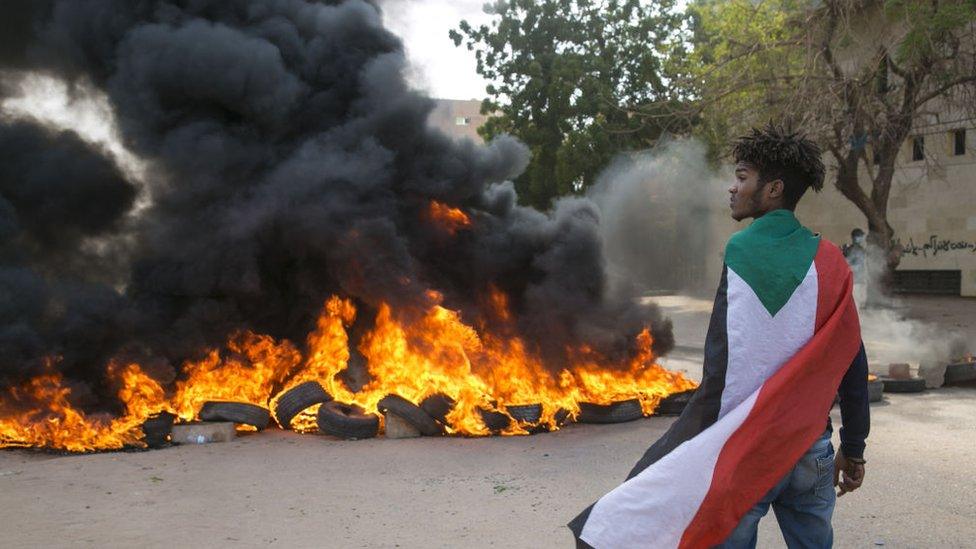
Sudanese people have continued to against the high cost of living, and to demand justice for victims of the ousted regime
Although Sudan's acting foreign minister later said that the decision was subject to ratification by a still-to-be-formed legislative body, external, the announcement was particularly significant as the East African state had hosted an Arab League meeting in 1967 which famously declared that there will be "no peace with Israel, no recognition of Israel, no negotiations with it".
In exchange, Mr Trump, if he wins a second term, is expected to keep pushing Ethiopia to address Egypt's and Sudan's concerns over the dam, while also ensuring that Sudan is removed from the US list of "sponsors of terrorism", opening the way for the country to get badly needed economic aid.
Mr Moore said that while the Trump administration would deserve credit if the US Congress removed Sudan from the terror list, its decision to link this to the recognition of Israel was risky for Prime Minister Abdalla Hamdok's government, which took power last year following the overthrow of long-serving ruler Omar al-Bashir.
"The issue of regularising relations with Israel has deeply divided Sudanese society. It could be a destabilising factor at a time when the government already has its own security challenges, and the peace is fragile," Mr Moore added.
Tensions with China
For Mr Abdi, a further concern about the effects of Mr Trump's policies on Africa was "the new Cold War" between the US and China.
One example was the fact that China has put up its first foreign military base in Djibouti, near the American base used for air strikes against militant Islamists in Somalia, the focal point of its counter-terrorism operations in Africa, and Yemen.
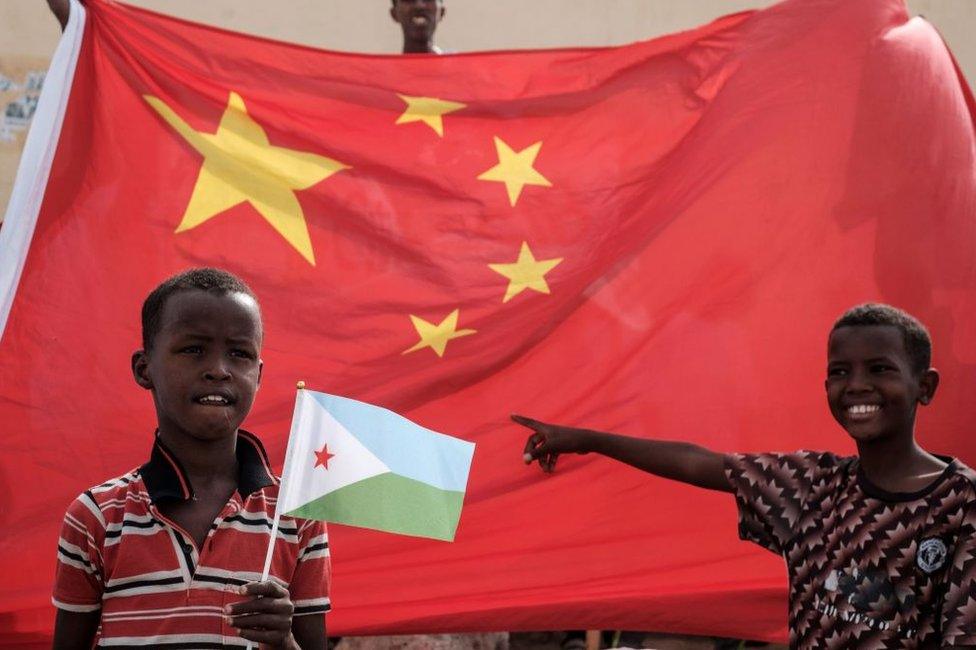
China built its first foreign military base in Djibouti
"Recently, American fighter jets were coming to land. The Chinese beamed experimental laser weapons that temporarily blinded the American pilots. It was what you'd expect in a James Bond movie," Mr Abdi said.
"Under Trump, the US has pursued an aggressive anti-China policy while China is increasingly becoming an assertive power. It has created a dangerous situation in the Horn of Africa," Mr Abdi added.
As part of its efforts to counter China's growing economic influence on the continent, the Trump administration unveiled Prosper Africa in 2018, external as the centrepiece of its policy for the continent.
"They want to double the amount of trade between the US and Africa, both ways. So it is a very notable objective and could be of huge benefit to Africa, more than what any other administration did, but they are still trying to figure out among themselves how it is going to work," Mr Moore said.
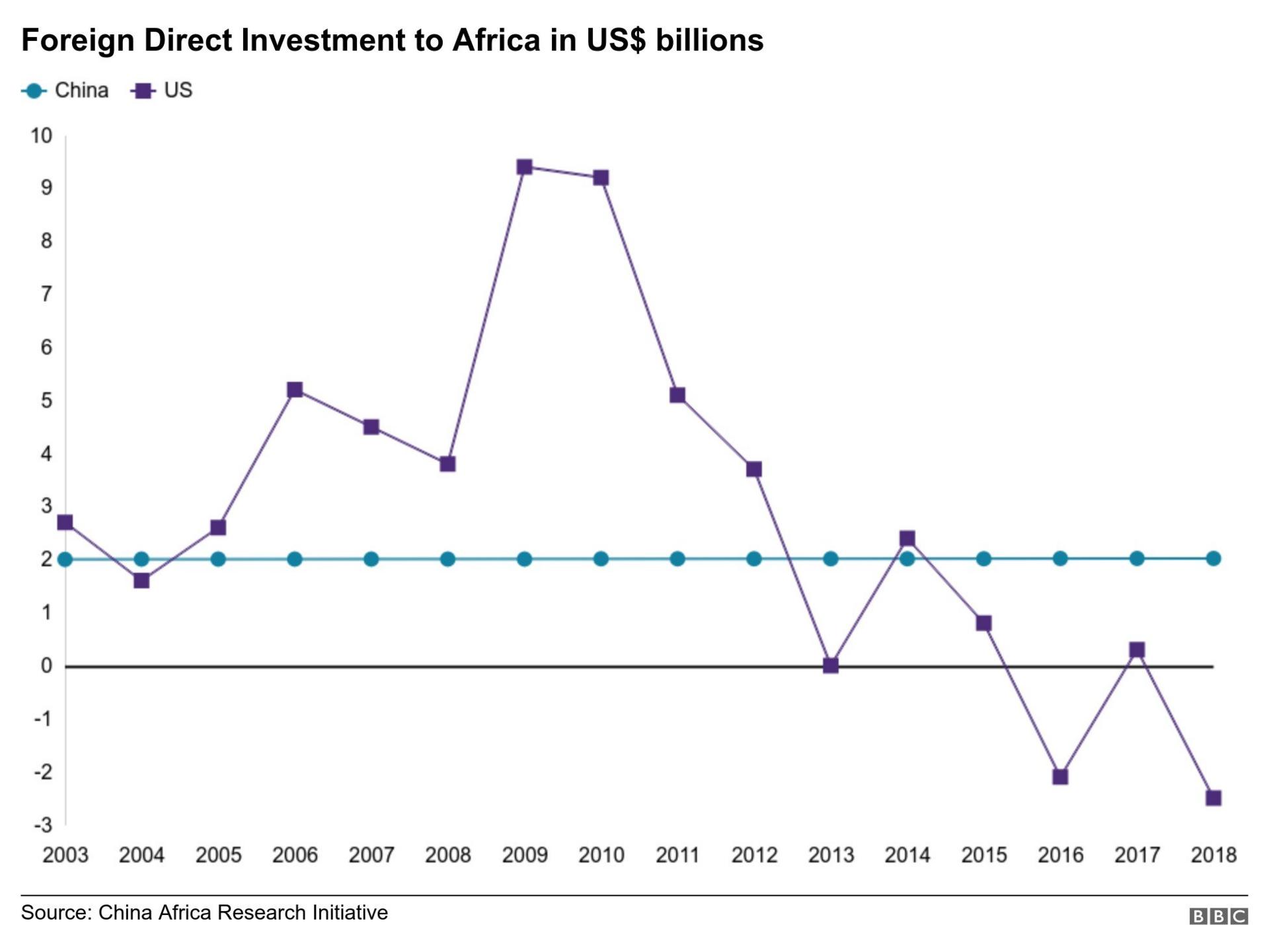
He added that US investments in Africa used to be primarily in Africa's oil and gas sector, but this has fallen sharply because of the growth of fracking in America.
The Trump administration set up a state-funded Development Finance Corporation in 2019 to help American companies gain a foothold in Africa.
"They want to provide financing to US firms, which have been complaining that they can't compete because Chinese firms come with financing. If you just look at the IT sector, almost 70% of Africa's IT backbone is built on Chinese components," Mr Moore said.
'Undermining' the African Union
The Trump administration has also decided to scrap the Africa Growth and Opportunity Act (Agoa) when it expires in 2025. It was the signature Africa policy of US Democratic President Bill Clinton, and gives African states preferential access to the US market.
Mr Moore said the administration's focus was on bilateral trade deals, and it is already in talks with Kenya, external - the economic powerhouse of East Africa which is part of China's Belt and Road Initiative that the US believes is aimed at building a series of trade routes that will link the Asian giant with Africa, thereby strengthening its global dominance.
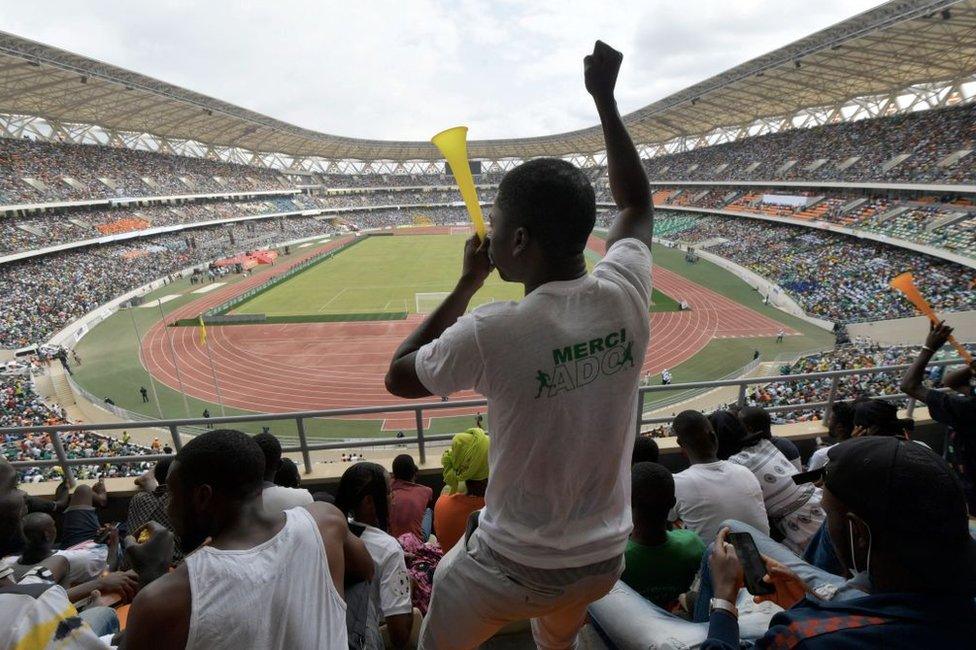
China has built roads, railways and football stadia across Africa
"The Trump administration wants a deal with Kenya, which it will then use a template for a plethora of deals with other African states," Mr Moore said.
"Kenya has agreed to it because it has exploited Agoa to its advantage, and does not want to lose out on trade with the US," Mr Moore said.
This is despite the fact that African Union (AU) Trade and Industry Commissioner Albert Muchanga has expressed a preference to negotiate with "one voice" an "agreement between the whole of Africa and the US", external.
Mr Moore said the US' decision could undermine AU efforts to integrate the economies of African states with the aim of turning the continent into the world's largest free trade area.
"It's an extension of the Trump administration's policy of not working within multilateral framework agreements."
Kenya's decision to enter into bilateral talks was not a surprise either, Mr Moore said, adding: "The US holds the cards here because it is the market that African states want to access. No matter who is in power [after the 3 November election], Kenya will push its case for a bilateral deal unless its current access to the US market is guaranteed."
He added that Mr Biden, who served as Mr Obama's vice-president, had not yet spelled out his policy towards Africa if he won.
"A Biden administration might revert to what existed under Obama. But compared to China, whose foreign minister has started each year since 2000 with a visit to Africa, there are few high-level exchanges between the US and Africa.
"The Trump administration is not new in giving this low priority to Africa. It has just been worse," Mr Moore said.

